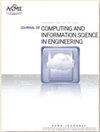An Adaptive Job Shop Scheduling Mechanism for Disturbances by Running Reinforcement Learning in Digital Twin Environment
IF 2.6
3区 工程技术
Q2 COMPUTER SCIENCE, INTERDISCIPLINARY APPLICATIONS
Journal of Computing and Information Science in Engineering
Pub Date : 2023-04-19
DOI:10.1115/1.4062349
引用次数: 0
Abstract
Practical manufacturing system operates in highly dynamic and uncertain environments, where stochastic disturbances disrupt the execution of production schedule as originally developed. Previous dynamic scheduling mainly focuses on the constructing predictive models for machine unavailability, with little studies on the adaptive and self-learning capacities for changing scheduling environments. Therefore, a digital twin (DT) driven scheduling with dynamic feedback mechanism is proposed, in which a reinforcement learning (RL) based adaptive scheduling is developed in DT to make corrective decisions for the disturbances during production runs. In the proposed architecture, the happening disturbance is firstly detected in the virtual layer by the status continuously updating in accordance with the physical workshop. Furthermore, the reschedule triggering condition is determined in real-time through quantization of the progress deviations resulting from disturbances. For the scheduling approach, the multi-agents RL (MARL) based adaptive scheduling method is built to perceive the dynamic production status from virtual environment and implement corrective strategies to hedge against the occurred disturbances. Finally, the proposed method is verified by a practical job shop case and the corresponding DT system is developed to show the effectiveness and advantages after a practical implementation.数字孪生环境下基于强化学习的自适应作业车间调度机制
实际的制造系统是在高度动态和不确定的环境中运行的,在这种环境中,随机干扰破坏了最初制定的生产计划的执行。以往的动态调度研究主要集中在机器不可用性预测模型的构建上,对调度环境变化的自适应和自学习能力研究较少。为此,提出了一种基于动态反馈机制的数字孪生驱动调度方法,在数字孪生中建立了一种基于强化学习(RL)的自适应调度方法,对生产运行过程中的干扰进行纠偏决策。在该体系结构中,首先在虚拟层检测发生的扰动,并根据物理车间的状态不断更新。此外,通过对扰动引起的进度偏差进行量化,实时确定了重调度触发条件。在调度方法上,建立了基于多智能体RL (MARL)的自适应调度方法,从虚拟环境中感知动态生产状态,并实施纠错策略以对冲发生的干扰。最后,通过一个实际作业车间案例对所提出的方法进行了验证,并开发了相应的DT系统,在实际实施后显示了该方法的有效性和优越性。
本文章由计算机程序翻译,如有差异,请以英文原文为准。
求助全文
约1分钟内获得全文
求助全文
来源期刊
CiteScore
6.30
自引率
12.90%
发文量
100
审稿时长
6 months
期刊介绍:
The ASME Journal of Computing and Information Science in Engineering (JCISE) publishes articles related to Algorithms, Computational Methods, Computing Infrastructure, Computer-Interpretable Representations, Human-Computer Interfaces, Information Science, and/or System Architectures that aim to improve some aspect of product and system lifecycle (e.g., design, manufacturing, operation, maintenance, disposal, recycling etc.). Applications considered in JCISE manuscripts should be relevant to the mechanical engineering discipline. Papers can be focused on fundamental research leading to new methods, or adaptation of existing methods for new applications.
Scope: Advanced Computing Infrastructure; Artificial Intelligence; Big Data and Analytics; Collaborative Design; Computer Aided Design; Computer Aided Engineering; Computer Aided Manufacturing; Computational Foundations for Additive Manufacturing; Computational Foundations for Engineering Optimization; Computational Geometry; Computational Metrology; Computational Synthesis; Conceptual Design; Cybermanufacturing; Cyber Physical Security for Factories; Cyber Physical System Design and Operation; Data-Driven Engineering Applications; Engineering Informatics; Geometric Reasoning; GPU Computing for Design and Manufacturing; Human Computer Interfaces/Interactions; Industrial Internet of Things; Knowledge Engineering; Information Management; Inverse Methods for Engineering Applications; Machine Learning for Engineering Applications; Manufacturing Planning; Manufacturing Automation; Model-based Systems Engineering; Multiphysics Modeling and Simulation; Multiscale Modeling and Simulation; Multidisciplinary Optimization; Physics-Based Simulations; Process Modeling for Engineering Applications; Qualification, Verification and Validation of Computational Models; Symbolic Computing for Engineering Applications; Tolerance Modeling; Topology and Shape Optimization; Virtual and Augmented Reality Environments; Virtual Prototyping

 求助内容:
求助内容: 应助结果提醒方式:
应助结果提醒方式:


